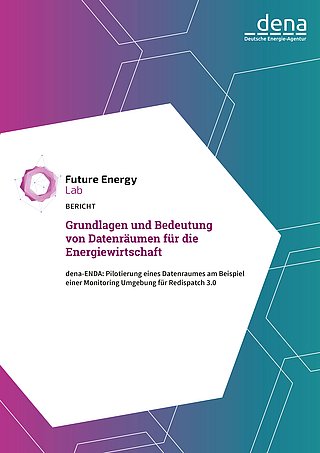Data spaces in the energy industry
New dena report uses the Redispatch 3.0 use case to show the requirements for the sovereign exchange of data
Berlin, Germany, 25 April 2024. The Future Energy Lab, dena’s pilot and networking laboratory for digital technologies, implemented a project to establish data spaces in the energy industry in cooperation with ifok GmbH, Bonn Consulting, Fraunhofer FIT and innogence business consulting. dena-ENDA is the name chosen for an energy data space that was created and that enables the interoperable exchange of data based on the Redispatch 3.0 use case. The project was outlined in the Fundamentals and significance of data spaces for the energy industry report, which was published today. The key finding is that secure end-to-end digital exchange of energy data is increasingly proving to be a key success factor for the necessary sector coupling on the way to decarbonising the energy industry. One important insight that can be drawn from the project is that the added value of data spaces for stakeholders must be demonstrated for the continued success of data spaces in the energy industry. The potential for monitoring, control and digital verification in the grid areas through automated processes using data rooms is huge.
Philipp Richard, Head of Digital Technologies & Startup Ecosystem at dena, emphasises that ‘we at the Future Energy Lab are consistently pursuing a path of support for the digital transformation of the energy system with innovative projects through this project. The project is looking to the future with the selected Redispatch 3.0 use case in order to be able to assess the solution space and the challenges of future developments today. The knowledge gained in the project is an important knowledge base and is ideally suited for the further exchange of experience with distribution and transmission system operators. As the Future Energy Lab, we are happy to be available for this and we are delighted to be able to show the players involved that it is possible.’
Development and implementation of a Gaia-X- and IDSA-compliant data space
The pilot project is the first time a data space has been set up in the German energy industry, demonstrating in a specific application how the sovereign and secure exchange of energy data can be realised with the help of a data space. A Gaia-X- and IDSA-compliant reference architecture was developed and implemented for a German energy data space. Netzgesellschaft Niederrhein mbH (NGN), together with PSInsight GmbH, was won over to provide the necessary real-time data from the distribution grid. The pilot project has laid the foundations that can be incorporated into current projects on data ecosystems such as the use case for the energy domain as part of the new data institute or the energy data – X project. It also showed that there are still major hurdles in terms of the standardisation and quality of existing data as well as the identification of clear responsibilities for data management in companies.
Analysis of use cases and selection of the Redispatch 3.0 use case
The main aim of the project was to develop a use case for the sovereign exchange of data between different players and thus demonstrate the advantages of an energy data space against the backdrop of the energy transition and the need to open up further flexibility options in the energy system. A number of use cases were analysed by a panel of experts and evaluated on the basis of various criteria such as relevance for the energy industry, feasibility and connectivity. At the end of this process, the Redispatch 3.0 show case was selected for implementation as a further development of the Redispatch 2.0 measures. Technical issues were clarified and a data space architecture developed in collaboration with the various stakeholders, such as distribution grid operators, system operators and service providers.
Recommended courses of action for politics and industry
The report also contains recommended courses of action that are necessary for the implementation of interoperable and sovereign energy data spaces. The most important recommendations mentioned in the report continue to include the acceleration of the rollout of smart metering systems and the consistent digitalisation of distribution grids as the infrastructural basis for energy data rooms. This is where the distribution system operators and metering point operators are called upon to expand the digital basis on the basis of the German Act to Relaunch the Digitalisation of the Energy Transition (Gesetz zum Neustart der Digitalisierung der Energiewende, or GNDEW). In addition, data governance issues need to be hashed out in further detail and decisions made to ensure interoperability across different data spaces and sector boundaries in the future.
About the Future Energy Lab
With the Future Energy Lab, dena has created a space in which the digital and energy industries convene on behalf of the German Federal Ministry for Economic Affairs and Climate Action. The goal is to test new technologies and regulatory approaches for the electricity, heating and mobility sectors in a think tank and pilot testing laboratory capacity in order to drive the the energy transition forward. The Future Energy Lab serves as a platform for bundling the cooperative efforts of all major industry players and creates a creative space for startups to develop innovative solutions.
Please visit https://future-energy-lab.de for further information.
-
 © HoffotografenSebastian Boie
© HoffotografenSebastian BoieSenior Expert, Communications T: +49 30 66 777 - 168 sebastian.boie(at)dena.de
